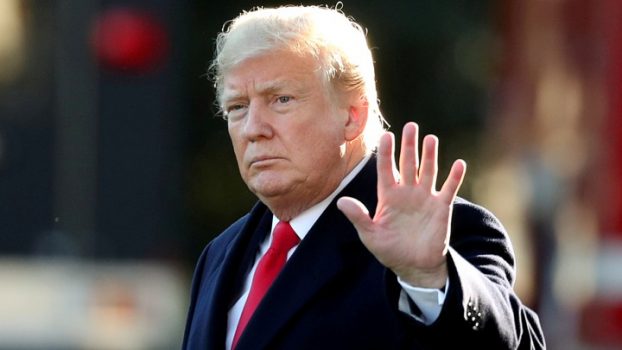The United States House of Representatives on Tuesday launched an official impeachment investigation of President Donald Trump after he allegedly encouraged a foreign leader to conduct a probe that could damage a political rival.
The House Speaker, Nancy Pelosi, a Democrat announced the investigation at a news conference, declaring that ‘no one is above the law’.
There has been growing support among Democrats for the move following Trump’s public admission that he asked Ukraine’s President, Volodymyr Zelenskiy to investigate the son of presidential candidate and former Vice President, Joe Biden.
However, President Trump is wasting no time in attempting to thwart Pelosi’s impeachment gamble in a battle which many political analysts say will define his presidency and the 2020 election.
Trump has pledged to publish an un-redacted and declassified transcript on Wednesday of a phone call with Ukraine’s leader at the center of what Democrats allege is his abuse of presidential power.
The White House is also planning to release to Congress a whistleblower’s complaint which triggered the week-long crisis that has rocked the Trump presidency.
Trump’s decision marks a departure for a White House under him which has a record of obstructing oversight and bending facts. So, his critics will await events on Wednesday with particular interest.
The transcript and the congressional reaction to the whistleblower’s report could be critical in establishing the early direction of the impeachment call and to shaping public opinion.
Trump insists that the transcript of a call with President Zelensky will show that he did not threaten to withhold $400 million in military aid to the former Soviet state unless it opened an investigation into the activities of Biden’s son.
Pelosi has already argued that Trump’s public admission that he spoke to Zelensky about Biden in itself represents an abuse of power by a President seeking foreign help to win reelection.
She said: “The actions of the Trump presidency revealed the dishonorable fact of the President’s betrayal of his oath of office, betrayal of our national security and betrayal of the integrity of our elections.
“Therefore, today, I am announcing the House of Representatives moving forward with an official impeachment inquiry,” Pelosi said during Tuesday’s news conference.
Regardless of the outcome, Trump finds himself at the center of a rare and historic showdown as only the fourth president in US history to face the realistic threat of impeachment.
Pelosi apparently took a huge risk by formally opening impeachment hearings, following months of reservations, apparently without knowing the contents of either document.
If the information contained in both does not fully back up the seriousness of her charge that Trump committed high crimes and misdemeanors, she may be seen to have overreached.
If the impeachment fails, Pelosi could unwittingly cause Trump to consider his unrestrained presidency which has frequently buffeted congressional norms as validated, paving the way to the Democrats’ ultimate nightmare, a second Trump term.
Even if the House inquiry ends with Articles of Impeachment and a majority vote in the chamber, no one believes that the Republican Senate will provide the two-thirds majority required to oust Trump from office.
Ultimately, if the fight is eventually resolved in Trump’s favour, the next election could throw up the historic anomaly of a President who was almost impeached and yet still won a second term.
Under the US Constitution, the president can be removed from office for ‘treason, bribery, or other high crimes and misdemeanors’.
Although what the above exactly means is unclear, it historically encompasses corruption and other abuses of the public’s trust as a president does not need to have violated a specific criminal law to have committed an impeachable offense.
Many legal commentators have said that pressuring a foreign leader to interfere in a US election is the sort of conduct the nation’s founders would have considered an impeachable offense.
However, a misconception about ‘impeachment’ is that it refers to the removal of a president from office. In fact, impeachment refers only to the lower chamber of Congress bringing charges similar to an indictment in a criminal case.
If a simple majority of the House’s 435 members approves bringing charges, known as ‘Articles of Impeachment’, the process moves to the Senate, the upper house which holds a trial to determine the president’s guilt or innocence.
In such a trial, House members act as the prosecutors, the senators as jurors while the chief justice of the US Supreme Court presides. A two-thirds majority vote is required in the 100-member Senate to convict and remove a president.
Currently, the United States House consists of 235 Democrats, 199 Republicans and one independent. As a result of this, the Democrats could impeach Trump with no Republican support.
The Senate now has 53 Republicans, 45 Democrats and two independents who usually vote with the Democrats. Conviction and removal of a president would require 67 votes.
That means that for Trump to be removed from office via impeachment, at least 20 Republicans and all the Democrats and independents would have to vote against him.
The Republican majority in the Senate could also vote to immediately dismiss the charges against Trump without considering any evidence.
No American president has ever been removed as a direct result of impeachment. President Richard Nixon resigned in 1974 before he could be impeached.
Two past US Presidents, Andrew Johnson in 1868 and Bill Clinton in 1998 were impeached by the House but not convicted by the Senate.
In the unlikely event that the Senate convicts Trump, Vice President Mike Pence would become president for the remainder of Trump’s term which ends on January 20, 2021.


Time Magazine Names AI Visionaries ‘Person of the Year’
Machado Vows Return To Venezuela After Nobel Peace Prize Win
Benin President Hails Military for Foiling Coup, Vows Justice
Trump Administration Halts Immigration Applications From 19 “High-Risk” Countries